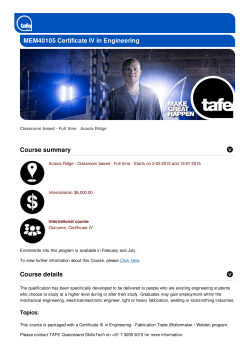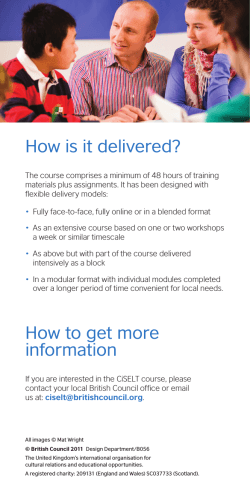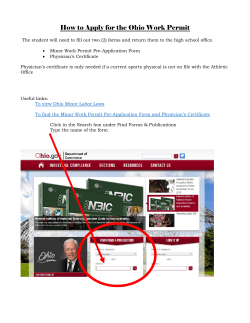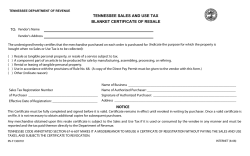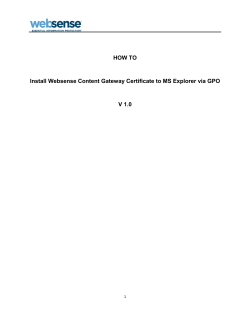
The Future Panchayats A presentation on e-Panchayat MMP Ministry of Panchayati Raj
The Future Panchayats A presentation on e-Panchayat MMP by Ministry of Panchayati Raj Structure of Presentation NeGP & ePanchayat Background Status of e-Panchayat ePanchayat & CSCs e-Panchayat - Approach Union Ministries’ Expectations Panchayats’ Roles Important Findings Core Common Software Applications 1 NeGP Vision & ePanchayat Importance The CSCs can perform tasks where decision-making is not required. Enabling Panchayats will bring the decision makers (GP) and the Service Delivery outlets (CSCs) closer, leading to better service delivery. "Make all Government services accessible to the common man in his locality, through common service delivery outlets, and ensure efficiency, transparency, and reliability of such services at affordable costs to realise the basic needs of the common man" 70% rural population, living in Panchayat jurisdiction. ePanchayat will enable the lowest tier of Governance and enable service provision at doorstep. The Gram Panchayat is constituted by the representatives of people and is best suited to define and provide for the basic needs of common man. ePanchayat will provide technology solutions to help GP manage these citizen needs better. Need for urgent approval since NeGP is to be operationalized by 2014 2 Background Jul – Dec ‘04 Apr – Jun ‘05 Feb – May ‘06 2006 - 2009 Jan – Dec ‘09 Jul ‘10 • National Advisory Council (NAC) in Apr, 2005 suggested • A “National IT for Panchayati Raj” project to monitor fund flows • Recommended back-end support at all levels of PRIs / PR departments for operationalization of services • DIT included e-Goverance for Panchayats as a MMP under NeGP • NREGA & BRGF launched – Provided big thrust to Panchayats and brought them to centre stage • Increasing role of Panchayats in flagship schemes Increasing Importance of Panchayats 3 Background Jul – Dec ‘04 Apr – Jun ‘05 Feb – May ‘06 2006 - 2009 Jan – Dec ‘09 Jul ‘10 • IT interventions for Panchayats across the country • ePanchayat in AP, InfoGram in Goa, eGram in Gujarat, PRIASoft in Orissa, Panchlekha in MP, Asthi in Karnataka, DRISHTI in WB • Most of these projects focussed on IT infrastructure & software related to Certificates, Tax collection & Fund Management • MoPR formulated eGovernance in Panchayats (ePanchayat) Need for a comprehensive & integrated eGovernance programme for Panchayats 4 Background Jul – Dec ‘04 Apr – Jun ‘05 Feb – May ‘06 2006 - 2009 Jan – Dec ‘09 Jul ‘10 • MoPR initiated the e-Panchayat Study Project to assess: • Role of Panchayats across various sectors • Needs of various Union Ministries / State Deptts that can be best fulfilled by the Panchayats • IT interventions made at the State level • ICT readiness of Panchayats • Service delivery needs of the citizens • Comprehensive nation-wide study across 114 Panchayats, 38 Districts and 27 States Roadmap prepared for comprehensive induction of eGov in Panchayats 5 Status of ePanchayat • ISNA conducted in 27 states / UTs, 38 districts and 114 Panchayats • ISNA study currently underway in 3 NE States and 3 UTs • 27 State ISNA and National ISNA reports submitted • BPR of 20 services formulated in all 27 states. • 27 State BPR reports and National BPR report submitted • DPR prepared for all 27 states and National DPR submitted • All reports are available on http://panchayat.gov.in 6 The Real Picture • ePanchayat will enable the work-flow leading to internal automation and back-end decision making • ePanchayat is for “Future Panchayats” and will augment the Institutional Capacity building initiatives for Panchayats • ePanchayat & CSC complement each other and CSCs could be additional channel to deliver the service • CSC can only do non-decision making tasks for Panchayats & other line departments • DIT acknowledges that some of the CSCs have become non-operational due to lack of G2C services CSCs unfairly seen as an alternative to ePanchayat 7 ePanchayat Study Project - Approach Wide-base consultative approach followed 11 Central Line Ministries consulted State PR Department was the anchor & over 10 State Line Departments consulted 23 Central Schemes studied to understand the data / information needs from grassroots & existing challenges District Administration, ZP, DRDA consulted & their opinions sought Block Administration, BP consulted and their needs assessed GP, Field level functionaries consulted and their challenges & needs assessed Citizens interacted and their aspirations & challenges captured by conducting Gram Sabha & one-to-one / focused group interactions Assessment of existing ICT initiatives done Plan to leverage the SWAN, SDC & CSC wherever available ePRI designed in a very Logical & Comprehensive Manner 8 ISNA Approach Assessing status of capacity, ICT readiness, key G2C services Identifying the pain areas of panchayats & citizens • Gram Sabhas • Discussions with citizen groups Consultation with stakeholders at Central line ministries ISNA Assessment tools used 1. Structured questionnaires State PR & line departments to understand expectations designed specifically for Centre, State, District and Citizens 2. Workshops at State and district level Interactions with all PRIs Identifying the needs of citizens (ZP,PS,GP) 3. Gram Sabha Meetings 4. Citizens discussions with focus groups like women, widoes, SC/STs, special abilities, senior citizens. 9 ISNA – Key Areas Studied Information & Services Needs ► I&S Needs of citizens ► I&S Needs of PRIs ► I&S Needs of State PR Department ► I&S Needs of Central line ministries eGovernance Readiness ► Initiative for computerization of PRIs ► Extent of Integration of relevant NeGP initiatives with PRIs ► ICT Infrastructure Assessment Rural Service delivery ► Delivery channels available ► Services rendered ► Challenges faced by citizens in service delivery Capacity Assessment ► Capacities - No. of officials, elected representatives, staff, trained manpower etc. ► Skills & Capabilities – Trainings needs ► Structural issues, if any PR Governance ► Organization structure of PRIs ► Extent of involvement in schemes (P, I, M, A)* ► Extent of involvement in committees ► Assessing status of devolution 10 * P: Planning, I: Implementation, M: Monitoring, A: Accounting Schemes Covered 1. NFSM 13. NLRMP 2. RKVY 14. IWDP 3. NHM 15. PYKKA 4. ICDS 16. Hostels for SCs / STs 5. NREGS 17. Central Sector Scheme of Free Coaching for SC and OBC Students 6. SGSY 7. PMGSY 18. Babu Jagjivan Ram Chhatravas Yojna (Hostels for SC/ST) 8. IGNOAPS 19. Tribal Sub plan 9. IAY 20. National Rural Drinking Water Programme 10.NRHM 21. Rashtriya Madhyamik Shiksha Abhiyan 11.TSC 22. Mid-day Meals Scheme 12.SSA 23. Scholarship Schemes 11 Union Ministries’ Expectations ICT based solutions at PRI for Data needs to be captured electronically at source Delays in reporting are often due to challenges in data entry Data needs to be captured to enable better planning for Central Schemes Better Implementation & Monitoring of the schemes is required at all levels Need for convergence of various schemes through PRIs Provision for information sharing between schemes viz. BRGF, NHM & NREGA as indicated during NHM study Information sharing between State pension data and IGNOAPS Connectivity needs to be provided to the GPs & BPs 12 Union Ministries’ Expectations …Contd Training is required for Panchayat officials to enable PRI involvement in Implementation, Service Provisioning & Selection of Beneficiaries for Data Capturing of Physical & Financial progress of Schemes Panchayats to be utilized for Information dissemination & publicity of Central Schemes Need specifically expressed by stakeholders of NFSM, RKVY, Scholarship, Tribal Sub Plan Management of lowest level legacy data & facility; & updation of data Need for scheme related data digitization & data capturing at source 13 Panchayats’ Roles Data entry related to planning, implementation of schemes Information Creator Spreading awareness about schemes and projects Information Manager Monitoring Agency Information Disseminator Maintaining databases and generating various MIS Monitoring schemes and functionaries PRIs – the support structure for grassroots Scheme Management 14 Scheme Execution at Grassroots (Recommended Roles) Sr No Scheme Name 1 NREGA Activities Information on NREGA scheme, eligibility criteria for beneficiary and benefits Availability of form for job card Submission of application for Job Card Verification of application Issuance of Job Card Demand of work on job card Allotment of work Information on Payment of wages Entry in Job card and muster roll Selection of work for NREGS Approval of works in PRI meetings Approval of work on the basis of NREGS criteria Preparation of detailed work plan Release of fund for execution of work Implementation of work Closure of work Maintaining records Audit of the scheme Preparation of MIS reports on implementation of scheme Responsibility Center GP CSC ✓ ✓ ✓ ✓ ✓ ✓ ✓ ✓ ✓ ✓ ✓ ✓ ✓ ✓ ✓ ✓ ✓ ✓ ✓ 15 Important Finding – Citizen Service Delivery State Andhra Pradesh Services Offered Kiosks CSC GP Office Rajiv Internet Kiosks Integrated 1. Registration and / RSDP are merged with Rajiv issuance of birth certificate into Rajiv Internet Internet 2. Registration and Village: Village issuance of death 1.Payment of Mobile certificate bills 3. Recommendation for 2.Payment of layout Insurance Premium 4. Permission for 3.Sale of Competitive Construction of Building / Exams Forms Approval of house building 4.Rail Ticket Booking plan etc. 5. Issue of Valuation 5. Revenue Services: Certificate for Property Case, Income, and Many More nativity Certificates, land records are envisaged to be delivered. Others GP Office performs the back-end functions that can be delivered through CSCs 16 Important Finding – Citizen Service Delivery State Kiosks Himachal eSugam Centres Pradesh 1.Collection and delivery of final documents for arms license 2. Booking of Railway tickets 3. Senior citizen passes 4. Passport form Sabji Suchna Kendra 1. Information dissemination - crop related, market price of agricultural produce Pehal - eGovernance Centre 1. Issuance of DL, RC Services Offered CSC GP Office Others 1. Utility bill 1. Issuance of 1. payments Certificates for Birth eSamadhan Death, Income etc Online 2. Payment of house grievance tax filing. GP Office performs the back-end functions that can be delivered through CSCs 17 Important Finding – Citizen Service Delivery State West Bengal Services Offered Kiosks CSC GP Office 1.Railway Tickets 1.Registration of Job 2.Electricity Bill Card 3.Water Bill 2.Birth & Death 4. Internet Certificate Browsing 3.Application for SC/ST 5. Digital scholarship Photocopying disbursement 6.Soil Testing 4.Application for Old 7. Telephone bills Age/ Widow Pension 8. DTP 5.Caste Certificate 9. Copy of Records 6.Disability Certificate of Rights 7.Income Certificate 8.Residential Certificate 9. Legal Heir Certificate 10. Application for Artisan & Fishery Pension Others Auxiliary Nurse/Midwives Registration of pregnant women & new birth Post Office Disbursement of Artisan & Fishery Pension GP Office performs the back-end functions that can be delivered through CSCs 18 Important Finding – Citizen Service Delivery State Assam Services Offered Kiosks CSC GP Office 1. Railway ticket 1. NoC for setting up booking, 2. LIC business, NoC for loans Insurance etc. etc. 2. Grievance redressal 3. Receipt of application for BPL cards 4. Scheme related services like Job Card for NREGA, IAY houses, SGSY cheques, Old age Pensions etc. Others GP Office performs the back-end functions that can be delivered through CSCs 19 Important Finding – Citizen Service Delivery State Gujarat Services Offered Kiosks CSC GP Office Others Jan Seva Kendra: 1. Mobile 1. Certificates Touch Screen Kiosks - Recharge related Birth, death, All talukas are given a 2. LIC insurance character, Income, touch screen kiosks to 3. Train Ticket Caste through ebe installed in the Reservations Gram building premises. These 4. Flight, Bus 2. Record of Rights kiosks are to be used to Tickets (Land Records) know services, schemes, 3. Payment of procedures to be Electricity Bills followed and other basic 4. Soil Test information about taluka Certificates, and other things. 5. Download of all application forms through eGram and Many more 6. NREGA job card issue GP Office performs the back-end functions that can be delivered through CSCs 20 Important Finding – Citizen Service Delivery State Madhya Pradesh Services Offered Kiosks CSC GP Office Samadhan Kendras 1.Mobile 1.Birth & Death 1. Domicile Certificate recharging Certificate 2. Registration of 2.Railway e- 2.Apply of vehicles ticketing widow/old age 3.Marriage Registration 3.Red bus pension Certificate service 3.Land/property 4.Birth & Death transfer Certificate 4.Apply for new 5.Khasra & B-1 Copy Ration Card 6.BPL Certificate 5.Employment 7.Copy of voter list registration & application for unemployment allowance 6.Registration for scholarship disbursement Others Aganwadi Workers Registration of pregnant women & new birth GP Office performs the back-end functions that can be delivered through CSCs 21 Core Common Applications Application Description 1 National Panchayat Directory Unique codes to all Panchayats, delimitation of Panchayats, will link all applications of e-panchayats 2 ActionSoft Scheme Implementation & Monitoring 3 Asset Directory information of assets & utilities created and maintained by Panchayats. This would evolve into an on-line Panchayat Assets/Utilities directory 4 ServicePlus To facilitate delivery of services to citizens 5 Panchayat Portals Web site for each panchayat, integration with other software applications for panchayats, to act as a single delivery gateway, using single sign-on. 6 Panchayat Profiler Socio-economic Information, Socio-demographic Information, Public Infrastructure & Services, Geopolitical Information of panchayats 22 Core Common Applications … Contd Application Description 7 PlanPlus Panchayat-wise Perspective Plan, Draft Plan, Action Plan & head wise estimates of the budget 8 PRIASoft Capture details of receipts & expenditure by PRIs, generate cash book, various registers, Utilization Certificate for various schemes 9 Social Audit Social audits conducted by Gram Sabha, the action taken report etc. 10 Grievance Redressal For citizens to lodge his/her grievance, its redressal 11 Basic GIS Applications Maps of panchayats & integrate with other applications for panchayats such as Panchayat Profiler, Planning & Budgeting, Asset Directory etc. so that a spatial view of the profile/plan of a panchayat can be obtained by overlaying various non-spatial data. 12 Skill Management To take care of training needs of Panchayat officials including elected representatives 23 National Panchayat Portal GIS Physical Progress Scheme Impl. Monitoring Accounting & Taxation Planning & Budgeting Approved Works Approved Works Training & Capacity Building Panchayat Profiler • Employment eligibility • Income data Employment Data on Expectant mothers • Old age benefits • Widow / disability pension Asset Directory • SSA/RMSA Enrollment data / MDM data • Scholarship eligibility Social Welfare Birth data – Health monitoring Monitoring of malnutritioned children Education Immunization readiness • From NREGA • From BRGF etc • From other Central Schemes • From State Schemes • Own Sources Health National Panchayat Directory Assets Grievance Redressal Social Audit Financial Progress Citizen Service Delivery – Service Plus Service Birth / death certificate No. of States requiring Through Extensive BPR service • Identified 15 existing and 5 new 21 Common certificates (Caste, Income, BPL, residence, domicile) 20 NREGS (registration, job card, demand for work) 16 Old age / Widow / disability pension 16 RTI 9 Marriage certificate 9 Ration card 8 services for all States • Identification of services through validation across the hierarchy viz. State, District, ZP, Block, BP, Gram Sabha & GP • Detailed To-Be process maps defined for each of these services Service Plus Software • Defines a generic service so that any service can be easily defined / modified – Highly customizable • Web interface for direct access to citizens • Can integrate seamlessly with other software of the Panchayat Application Suite • Certificates • Pension disbursements • NREGS 31 Thank You 2nd Oct, 09 to 2nd Oct, 10 “Year of the Gram Sabha for empowered people & accountable Panchayats” Broadband Coverage – 30/Apr/2010 BROADBAND COVERAGE OF VILLAGE PANCHAYATS 30.04.2010 Village Panchayats Covered through S.No Circle 1 2 3 4 5 6 7 8 9 10 11 12 13 14 15 16 A&N AP Assam Bihar Chattisgarh Chennai Gujarat Haryana HP J&K Jharkhand Karnataka Kerala Kerala-Lakshadeep Kolkatta MP Total VPs ADSL 67 21870 2489 8463 9837 1730 14031 5884 3243 4893 4559 5652 991 10 158 23004 56 10917 693 1679 1493 139 7014 4098 1308 642 321 3256 989 5 158 2636 Wi-Max 0 0 275 422 252 0 0 1139 109 0 548 0 0 0 0 1521 Total Covered 56 10917 968 2101 1745 139 7014 5237 1417 642 869 3256 989 5 158 4157 2 Mbps BB feasible on ADSL X X X 1442 1493 X 6181 4098 X X 321 X X X X X Planned through ADSL 0 0 0 72 326 0 0 0 734 6 0 109 0 1 0 291 Wi-Max 0 5121 2014 6824 2815 139 2302 1245 1168 2077 3939 757 0 0 0 11181 Total Planned 0 5121 2014 6896 3141 139 2302 1245 1902 2083 3939 866 0 1 0 11472 33 Sources: (1)BSNL Broadband Coverage – 30/Apr/2010 …Contd BROADBAND COVERAGE OF VILLAGE PANCHAYATS 30.04.2010 Village Panchayats Covered through S.No Circle Total VPs ADSL 17 18 19 20 Maharashtra N E I- Tripura N E I- Mizoram N E I- Megalaya 28079 1003 768 0 9366 160 175 0 21 22 23 24 25 26 27 28 29 30 31 32 33 34 NE II- Arunachal Pradesh NE II- Manipur NE II- Nagaland Orissa Punjab Chandigarh Rajasthan Tamil Nadu TN- Pondicherry UP (East) UP (West) Uttaranchal W.B. WB Sikkim Total 1766 1514 1110 6494 12200 23 8370 11433 98 37607 13660 7546 3354 163 242069 70 60 982 1379 9642 16 2424 7311 98 7913 2585 1698 1137 66 80486 Wi-Max 0 Total Covered Planned through 2 Mbps BB feasible on ADSLADSL 342 9366 502 175 0 X X X X 0 0 6 0 148 0 689 0 522 0 0 1168 3149 303 292 0 10879 218 60 982 1379 10331 16 2946 7311 98 9081 5734 2001 1429 66 91365 X X X X X X X X X X X 1698 X X 15233 0 0 0 0 82 0 0 0 0 0 0 0 211 5 1843 Note: X--> Information is being collected from these States Wi-Max 5964 Total Planned 1000 5964 1000 6 0 434 2633 848 0 5424 2166 0 28526 8705 974 1714 0 97970 434 0 0 2633 930 0 5424 2166 0 28526 8705 974 1925 5 99813 34 Sources: (1)BSNL State Name Andhra Pradesh Arunanchal Pradesh Assam Bihar Chattisgarh Daman & Diu Goa Gujarat Haryana Himachal Pradesh Jammu & Kashmir Jharkhand Karnataka Kerala Madhya Pradesh Maharashtra Manipur Orissa Puducherry Punjab Rajasthan Sikkim Tamil Nadu Tripura Uttar Pradesh Uttarakhand West Bengal No. of Offices ZP No. of ZPs having computers BP No. of BPs No. of having Offices computers 22 16 21 38 16 2 2 26 19 12 22 24 29 14 48 33 4 30 22 0 21 0 16 2 2 26 19 12 0 0 29 14 48 33 4 30 20 32 4 30 4 71 13 18 20 32 4 30 4 71 13 18 1097 150 185 531 146 1097 0 185 0 146 224 119 75 143 212 176 152 313 351 224 119 75 0 0 176 152 313 351 314 10 141 239 314 10 141 239 385 40 820 95 341 385 40 820 95 341 GP No. of Offices 21809 1751 2202 8463 9820 14 189 13693 6155 3243 4139 4559 5628 999 23040 27896 165 6234 98 12809 9148 163 12618 1040 52126 7541 3354 No. of GPs having computers 21809 0 0 0 0 14 189 13693 0 1185 0 0 5628 999 0 409 165 6234 98 0 1100 163 12618 0 0 0 3354 Computers in over 80% of ZPs & BPs; But only 35% of GPs 35 CSC Status – DIT Website • As on 31st October 2009, a total of 55,979 CSCs have been rolled out in twenty-five States. • Master Service Agreements (MSA) have been signed in 25 States covering 109,348 CSCs. • The rollout is more than 75% complete in 5 States & in another 7 States the implementation has crossed half way mark. • Another 2 States have completed the bid process & rollout is expected to commence shortly. • Expected roll out of 100,000 CSCs to be largely complete by June 2010. • SPV is being formed, so that the Government can progressively migrate to an eGovernance platform and enable services through the CSC network. Government of India is in the final stage of forming the SPV. The name of the SPV is "CSC e-Governance Services India Ltd". Some of the CSCs have reportedly become nonoperational in view of lack of availability of adequate 36 G2C & other services Integrated Child Development Services (ICDS) Objective: Lay the foundation for proper psychological development of the child Central Line Ministry Ministry of Women and Child Development Intended Beneficiary • Women & Children Key Stakeholders ► Ministry of Women and Child Development ► Ministry of Health and Family Welfare ► Medical Officers incharge of Health Sub-Centres and Primary Health Centres ► ANM ► District Programme Officers (DPOs) ► Child Development Project Officers (CDPOs) ► Anganwadi Worker ► Lady health visitors (LHVs) ► Auxillary Nurse Midwife and female health workers ► PRIs (Data repository at village, block, Tehsil/Talluk and District level to facilitate District Planning Process & Maintain latest Parivar Register) E-Readiness No IT Initiatives for the ICDS as of now. Challenges Faced ► Information not readily available ► Information regarding other scheme entitlements like PDS to all the poor women given or not ► Anganwari register monitoring ► Availability of Health worker at village level ► Immunization Status ► Capturing status of availability of drinking water Expectations from ePRI MMP 1. Information management 2. Tracking of actual delivery of service to the intended beneficiaries 37 National Rural Employment Guarantee Scheme (NREGS) Objective: To enhance livelihood security in rural areas by providing at least 100 days of guaranteed wage employment Central Line Ministry Ministry of Rural Development Intended Beneficiary • Rural households whose adult members volunteer to do unskilled manual work Key Stakeholders ► Wage seekers ► Gram Sabha ► PRIs, specially the gram panchayat ► Programme Officer at the block level ► District Programme Coordinator ► State Government ► Ministry of Rural Development ► PRIs (involved in the complete lifecycle of the scheme from Planning to implementation and monitoring) E-Readiness ► Use of web application for entering fund flow details and Planning and Works Management Module Challenges Faced ► Currently data being entered at the block level, it is desirable to have the data entered at GP ► The manpower at GP level is not capable enough in using computer and the web based IT applications. Expectations from ePRI MMP 1. Data entry from GPs 2. Trained manpower at GP for accounting & IT application usage 38 Sarv Shiksha Abhiyaan (SSA) Objective: Availability of quality elementary education to children Central Line Ministry ► Ministry of HRD ► Department of School Education & Literacy Intended Beneficiary ► Children Key Stakeholders ► Ministry of HRD ► Department of School Education & Literacy ► Department of Rural Development ► Department of Panchayati Raj ► NGO ► Panchayats ► Monitoring & supervision of scheme at Gram level E-Readiness ► No scheme specific software. A web based MIS reporting tool is being used for provide MIS and scheme related information Challenges Faced ► Monitoring of scheme Expectations from ePRI MMP 1. ICT based solutions / interventions at PRI level ► Connectivity at the lowest level ► Management of lowest level legacy data and facility to update data at the lowest level ► Integration with other scheme data such as state pension schemes etc 2. Capacity Building interventions required at PRI level for: ► Trained and skilled manpower at Village level 39 Financial Progress Accountin g& Taxation Physical Progress Planning Approved Works & Budgetin g Employee / Elected Representative Details Service Delivery PRI Profiler Approved Plan Resource Profile Receipt & Exp Details Citizen / Employee Details PANCHAYAT ENTERPRISE SUITE National Panchayat Portal GIS Social Audit Approved Works Scheme Impl. Monitorin g Asset Profile Completed Assets Asset Directory Resident & Employee Details Grievance Redressal Physical Progress Skill Management National Panchayat Directory 40
© Copyright 2026



